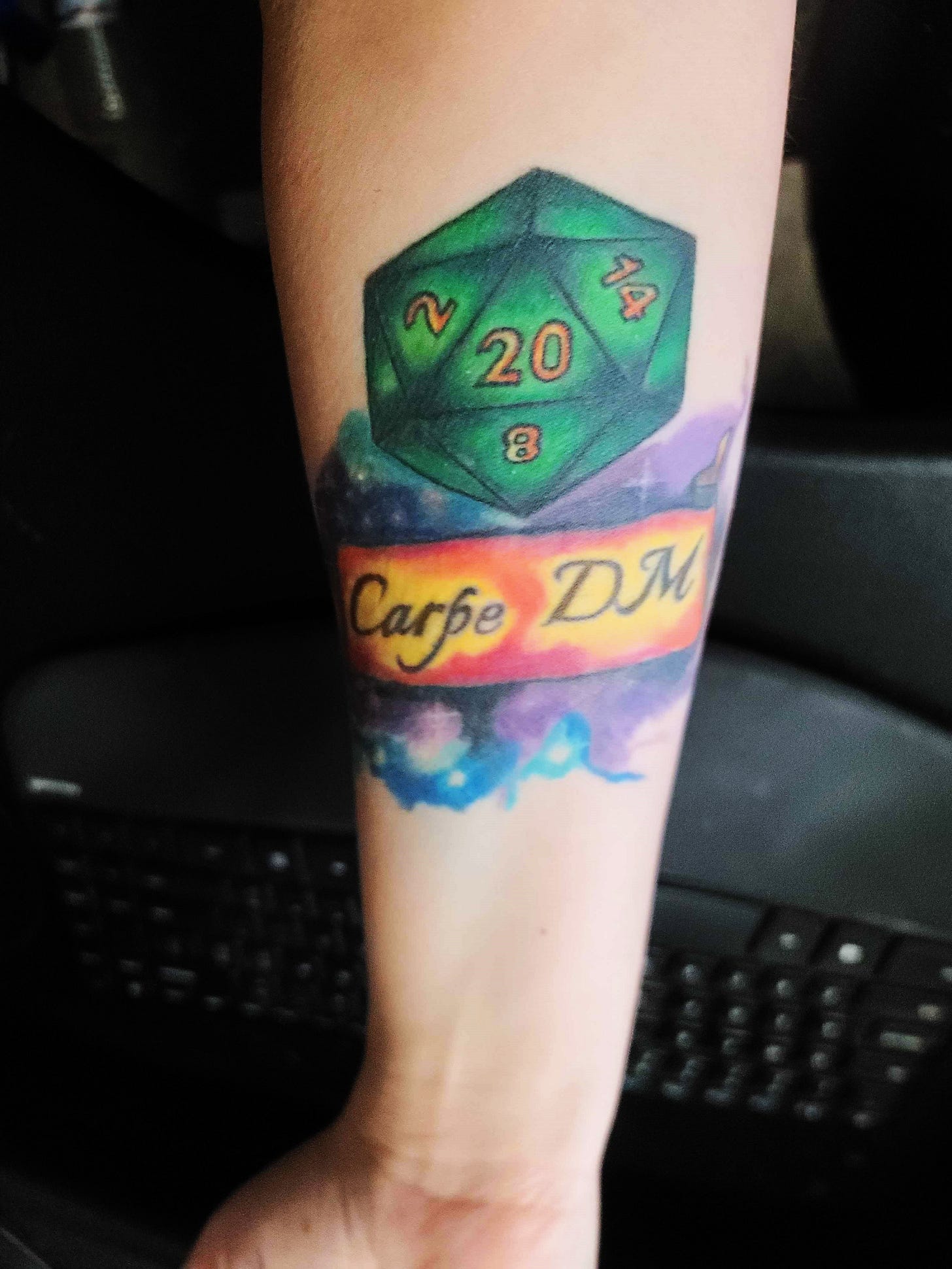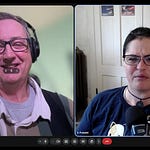Anybody who’s known me for longer than an hour or so likely knows I’m a D&D player. The giant D20 tattoo on my right forearm that says “Carpe DM” beneath it is a dead giveaway, but I also talk about my TTRPG (tabletop role-playing game) obsession pretty constantly. I am in three games right now, one of which I run, and we meet weekly. As adults. Suffice to say, I am that nerd.
I’m saving up for my next part of that half sleeve which is going to be the Holy Avenger (a specific sword usually used by paladin characters, and I play almost exclusively paladins).
So what does this have to do with writing?
One of the big things about TTRPGs is learning to embody a specific character and getting deeply into their mind because you are portraying their actions at the table. While some games don’t have as much depth as others, the ones I play are run by people who, like me, are really interested in the narrative story of their characters. We do voices, sometimes have props, and have deep and complex relationships between them.
For example, I am currently playing through Curse of Strahd (a famous D&D module) with a group of friends. To nobody’s shock or surprise, I am playing a paladin. That said, while I usually default to playing paladins, each character is different and has different stories. The one I am playing now is Sir Kethric. He is a half-orc man with a severe learning disability.
To be clear, he is not played as stupid; he just has negatives to book learning traits. If you are new here, I am autistic and have learning disabilities myself, and I chose to give him one because of the way the stats work in play. He has a negative to his intelligence stat, and rather than making him unintelligent, I decided he struggled with book learning due to a learning disability. I know it may sound ableist AF, but I am not playing him that way. He doesn’t speak slowly or anything. In fact, he’s a very commanding presence.
Sir Kethric was orphaned at a young age and left at the steps of a church to the deity Lathander (he represents goodness, light, justice, and redemption). Despite being an orphan, he has no trauma with it. He genuinely believes his parents did the best they could, and he led a good, rewarding life as a young soldier and is now a paladin in the Order of the Rising Sun. Being a paladin means he can cast spells that drive back darkness and evil and can heal people to some extent. He is also a fierce enemy against evil creatures. In Curse of Strahd there are a lot of undead and awful things that need smiting.
As an Oath of Redemption paladin, Kethric believes in trying to call out the souls who can be turned away from the path of evil. He does his best to see the good in others and is a little too trusting sometimes (again, low intelligence), but he isn’t a fool. He also knows when to swing a sword.
When I started play, his entire story was that he was an orphan but happy about it and came into Barovia (the country the game takes place in) as a happy young man who is doing his best to do good and care for others. We are now partway through the story (Strahd just showed up and attacked the church), and I am learning more about him as I play. I also have seen how he interacts with others, and I’ve gotten to know his mind far better.
No small part of acting is reacting, or so the saying goes, and that is also true of character development. Through playing him with other people, I have learned how Kethric reacts to things. I have learned how he feels about various situations and have gotten to really dig deep into who he is. This process has made him a very robust character with a lot of layers. (Seriously, I could talk about him for about two hours if you let me.)
This transfers into writing because when I am creating characters, I often will spend time thinking about and feeling out how they interact with others and using those reactions to build nuance into the characters and learn how they feel about the world. For example, at the start of this campaign, Kethric could not read. He is severely dyslexic. So, instead of taking session notes in a traditional way, I decided his journal is actually a sketchbook. He draws images of things that impacted him (alongside out of character notes so I don’t forget important details).
Other characters at the table learned he couldn’t read, and several of them noticed that he’s always carrying around a journal. He’s also given drawings as gifts to people before. One of the characters, who he thought didn’t like him much, had him draw a bunch of lines over and over and over again and through that taught him to write his name. It was a precious interaction that I cherish.
These interactions develop the story of our characters, the plot of the world, and our understanding of the characters themselves.
Now, if all of this seems like side nonsense, it isn’t. I’m laying this out for a reason.
A lot of writers have never played Dungeons and Dragons (or any TTRPG), and I respect that. For many of you, there’s no real interest. However, one thing I do think you could benefit from as a writer is the chance to really embody your character. Cassiel, the main character from my series Smoke and Magic is actually born of a long-standing character I have played across many campaigns and in many forms across my life. I actually created her well over a decade ago for a game, and through playing her in various contexts, I have a very deep understanding of the character and her mind. I’ve played her as a paladin in Pathfinder 1e, I’ve played her free-form in a number of text-based roleplays, I’ve played her in a game of Monster of the Week (which was a modern setting), and in many other contexts. I know that character so well, she’s an extension of my own mind.
If you ever have the opportunity to play a TTRPG (and there are many ways to get into the hobby), using it as a test run to develop characters by putting them in different situations can create a great deal of richness and depth. Also, if you are playing them in a TTRPG, you will have the opportunity to see how they respond to a variety of different people played by minds other than your own. Kethric being taught to write his name by someone teaching him the shape of the symbols over and over again rather than as a “word” was brilliant. I never would have come up with that.
While, yes, I am unashamedly a TTRPG fanboi (I refer you to the above photo of my tattoo), I feel that it has a great deal to offer writers, and I encourage you to explore the space and see if you can’t get into the hobby a little. Bonus, if you become a Game Master, you can test plots and see how people respond to your side characters and concepts in real time. It can be a great way to test your storytelling capabilities. Plus, if you can think around your players doing unexpected, confusing, and hilarious things in context of your story, you can overcome any plot hole your book throws at you.
Seriously, my players routed an army with a snowman and a bag of endless rats. If I can handle that, I can handle anything.












